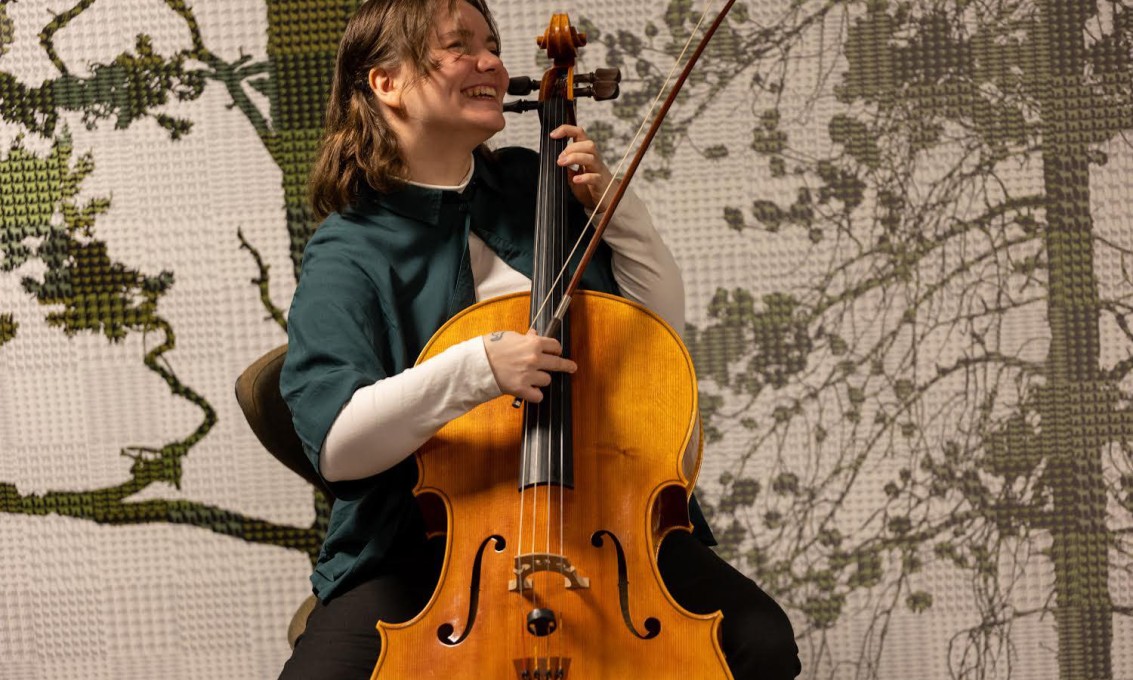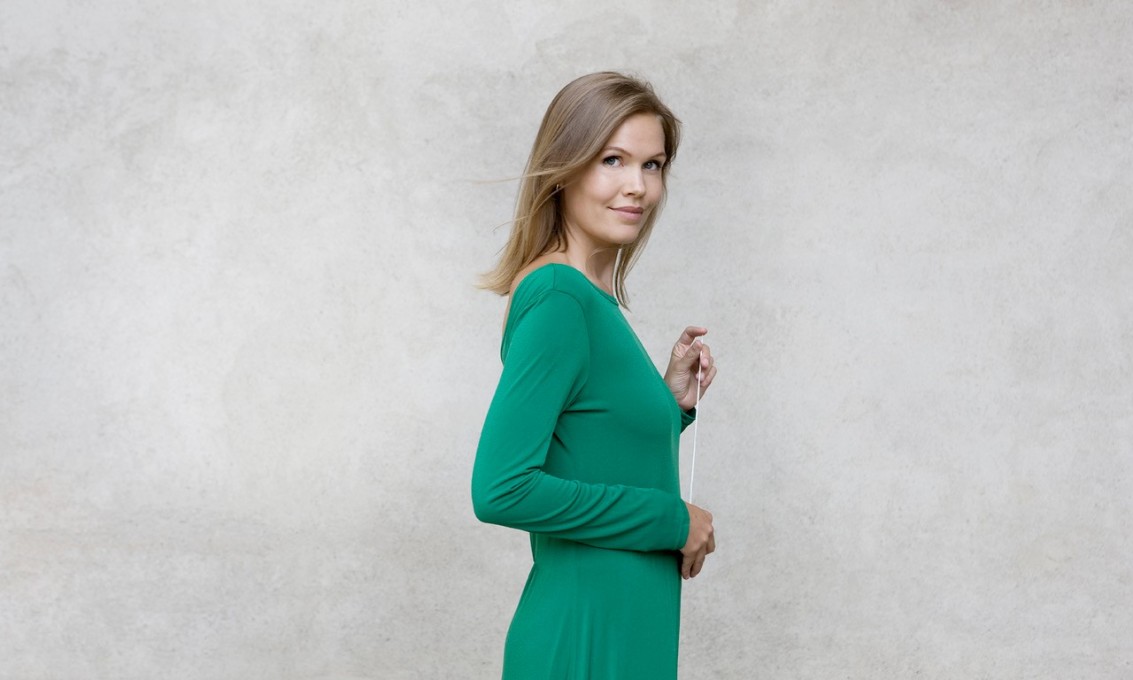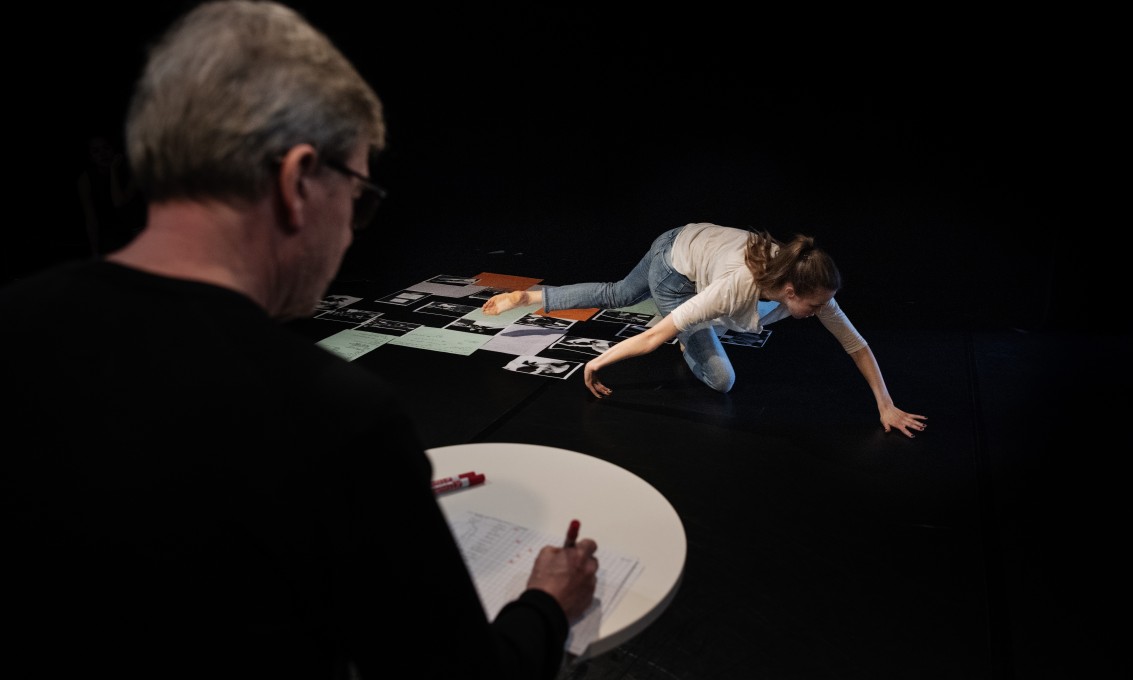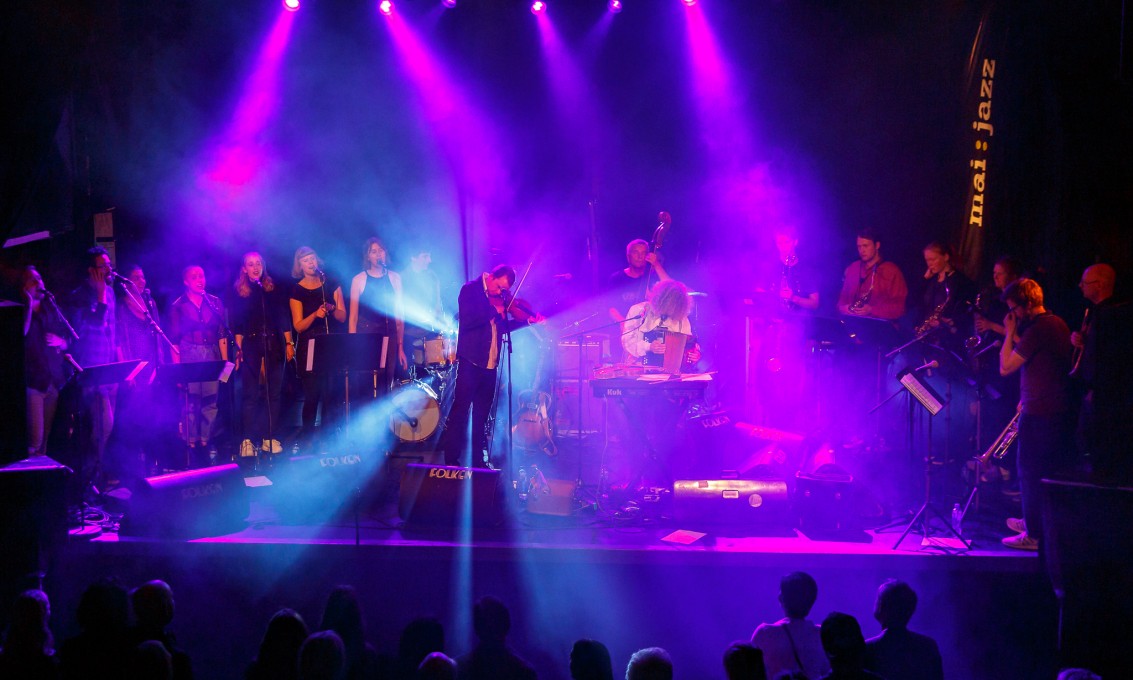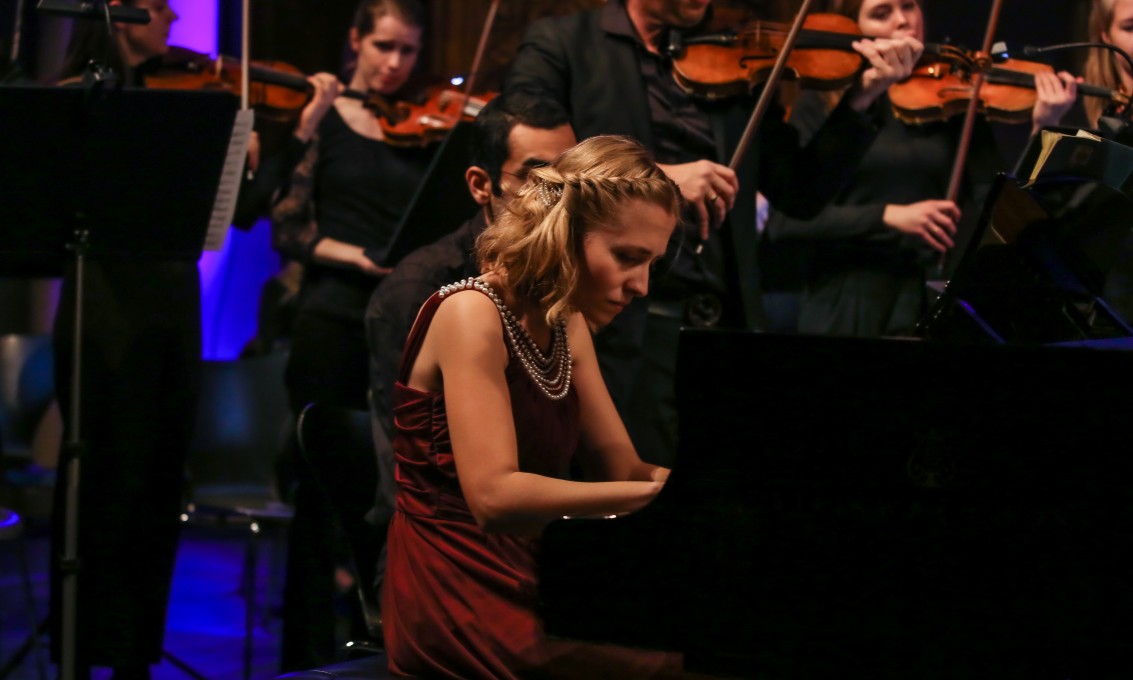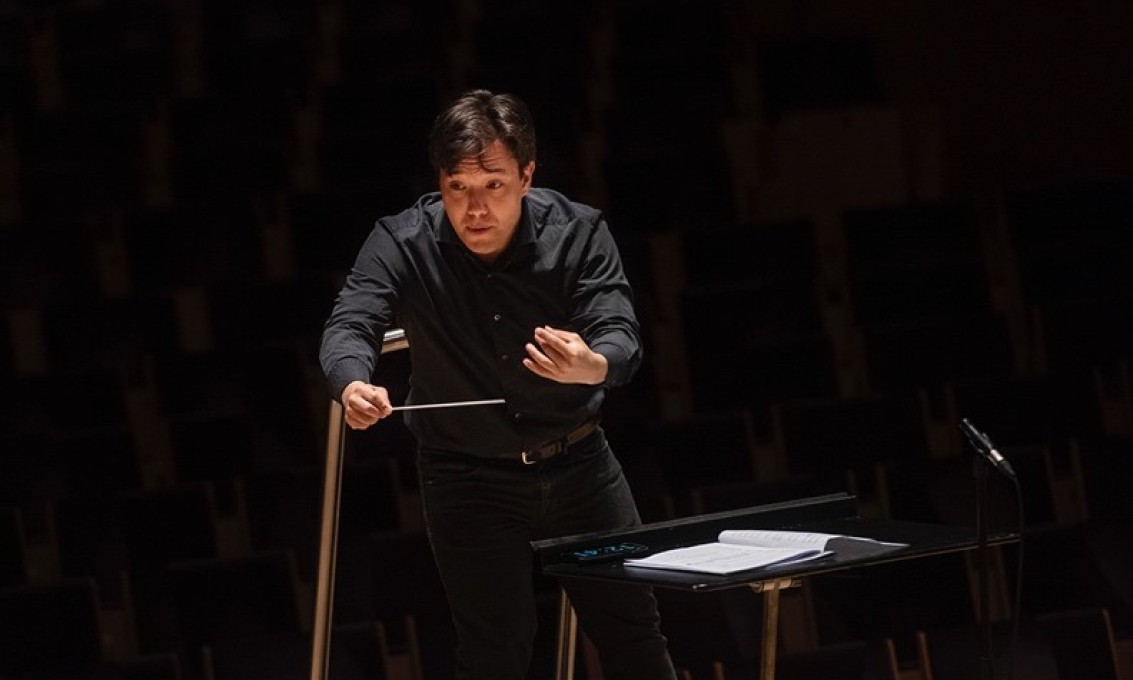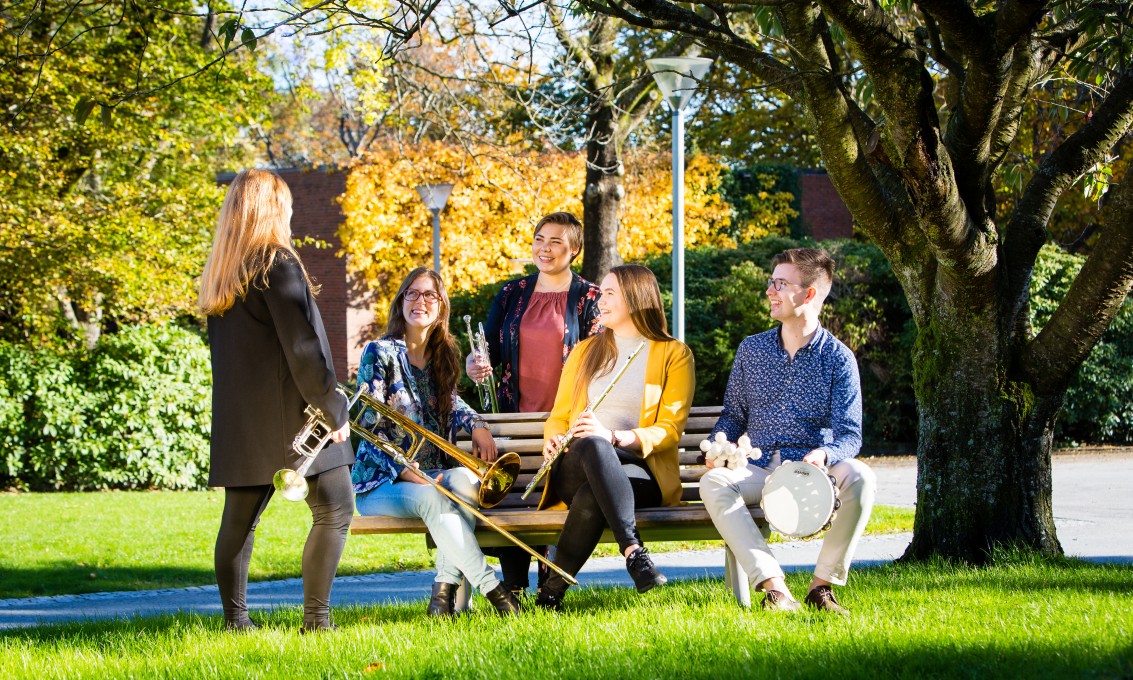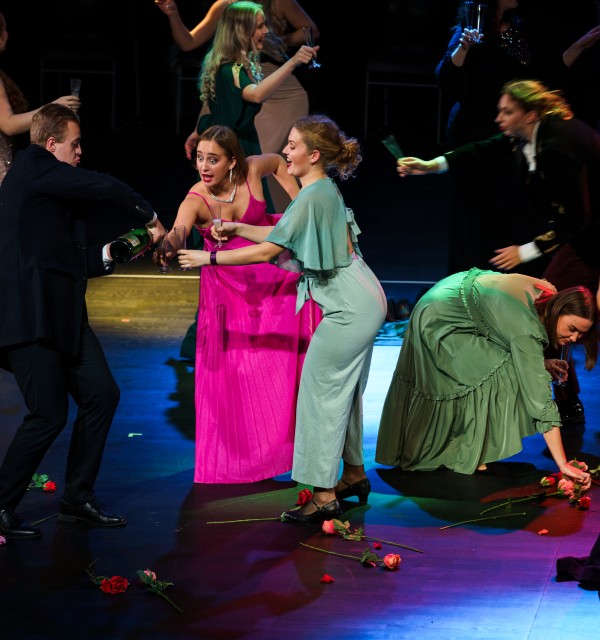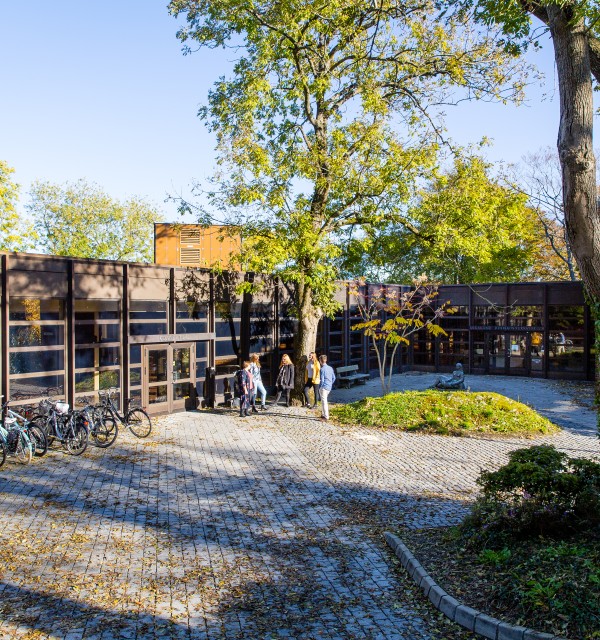Do you want to develop your instrumental skills and your artistic profile on your main instrument? Extension studies gives you the opportunity to add and specialize further from a completed bachelor's programme in music performance. You will learn more about artistic dissemination on a professional level.
1 year
60
Approx. 10
English
Round 1 - Video Round 2 - On Campus Bjergsted week 10
15. December - Main admission
FUK UiS - association for all students at the Faculty of Performing Arts.

About the study programme
Education takes place through individual tuition, ensemble activity, master classes, project work, seminars and concerts.
The programme offers different subjects: Instrument/vocal and chamber music/ensemble, Instrument/vocal and secondary instrument and Instrument and Conducting.
The programme provides an opportunity for supplementary and in-depth study in the extension of the bachelor's programme in music performance. You will learn more about artistic dissemination on a professional level.
After completing your studies, you will have learned to perform a repertoire with variety and difficulty that shows that you have reached an advanced level both technically and artistically.
If you choose to immerse yourself in chamber music, you will develop your ability for chamber musical interaction, and gain an artistic understanding of different styles and modes of expression in chamber ensembles. You will also learn how to lead and instruct chamber music at various levels. The programme is flexible for students who want a longer exchange stay at one of our international partners.
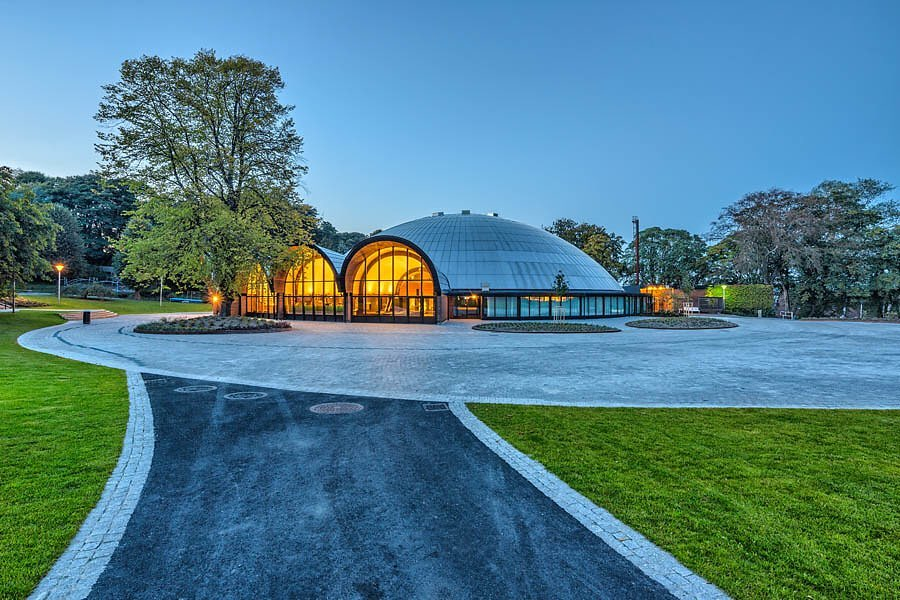
Bjergsted Culture Park
The Faculty of Performing Arts is part of Bjergsted Culture Park. For students this means that they become part of a larger music and art environment that provides a good framework and opportunities for development in their music area. There are close ties between the professional art and cultural life in the region, and the faculty's activities.
Specializations
At Bjergsted, we have strong academic environments in each of the specializations. Highly qualified teachers will give you a solid technical-methodological, artistic and theoretical basis for a career as a performing musician in classical, jazz or conducting. You will learn about communication on your main instrument, and develop your skills as a musician and instrumentalist
All study programmes affiliated with the Faculty of Performing Arts are under annual revisions. Revised study plans and course descriptions for the academic year 2024/2025 will be published here on 1 February 2024.
Meet our students
Career prospects
You can work as a professional musician, and/or combine your studies with pedagogy and work as a music teacher.
Learning outcomes
All study programmes at the UiS have a set of defined learning targets. Read more about the learning outcome for this study programme.
Upon completion of the programme, the candidate should be able to:
General competence
- Reflect on their own performing practice at a higher level than at the end of the bachelor's degree in performing music
Knowledge
- Have a high level of knowledge in the field and insight into his main instrument at a higher level than at the end of his/her bachelor's degree in performing music.
Skills
- Demonstrate an advanced level as a performing musician
- Demonstrate artistic dissemination on a professional level
Study plan and courses
Enrolment year: 2025
-
Classical eller Jazz
-
Veivalg - Jazz
-
Instrument-/vokalemne og kammermusikk/ensemble
-
Ensemble - Jazz
Year 1, semester 1
-
-
Instrument/vokal og arrangering/komponering og interpretasjon
-
Arranging/composing and interpretation
Year 1, semester 1
-
-
Hovedinstrument/vokal og et biinstrumentemne
-
Secondary Instrument
Year 1, semester 1
-
-
-
Veivalg - Klassisk
-
Instrument-/vokalemne og kammermusikk/ensemble
-
Chamber Music - Classical
Year 1, semester 1
-
-
Hovedinstrument/vokal og et biinstrumentemne
-
Secondary Instrument
Year 1, semester 1
-
-
Instrument/vokal og arrangering/komponering og interpretasjon
-
Arranging/composing and interpretation
Year 1, semester 1
-
-
-
Veivalg - Dirigering
-
Instrument-/vokalemne og kammermusikk/ensemble
-
Chamber Music - Classical
Year 1, semester 1
-
-
Hovedinstrument/vokal og et biinstrumentemne
-
Secondary Instrument
Year 1, semester 1
-
-
Instrument/vokal og arrangering/komponering og interpretasjon
-
Arranging/composing and interpretation
Year 1, semester 1
-
-
-
How to apply for Extension Studies in Music Performance
Important information for applicants applying to Extension Studies in Music Performance.
Please Notice! All information regarding the application and admission process will be updated after 1. November.
Everything you need to know about admission requirements, entrance exam, repertoire requirements, video requirements etc. can be found in the article below.
- Admission to Extension Studies in Music Performance is processed locally at the faculty
- Apply through SøknadsWeb and submit the Specification form within 15. December
- Check the admission requirements
- All necessary documents and the Specification form must be submitted within the deadline. Please see below for more information
- When you have submitted an application in Søknadweb, you can find the link to the Specification form in the application receipt. The link can also be found in the confirmation e-mail sent from Søknadsweb
- Incomplete applications will not be evaluated for admission
- All applicants applying to performing music studies must complete 2 rounds of entrance exams. Round 1 is a self-produced video recording. Round 2 takes place at the Campus Bjergsted in Stavanger. Round 2 is only for applicants who pass round 1
- Round 1 consists of submitting a project description, as well as a self-produced video recording for music applicants. Round 2 is carried out on Campus Bjergsted in Stavanger in week 10. Round 2 is only for applicants who has passed round 1
- Applicants who have sucessfully submitted the Specification form, will shortly after the application deadline receive an e-mail with information on how to submit the video
- The deadline for sharing video is 15. January
- Start planning video recording early
- All applicants will also be asked to share a review of the submitted video material together with a complete audition programme for a possible round 2. Remember sheet music for the accompanist/band
- Both round 1 and round 2 must follow established repertoire requirements, as well as spesifications for video recording. For more information, please read Repertoire requirements Extension Studies and Round 1 - Submission of self-produced video
- The result of the assessment of round 1 will be shared by e-mail in January/February
- If you pass Round 1, you will be invited to round 2 by e-mail to Campus Bjergsted in week 10. Round 2 consists of an entrance exam and interview with the assessment comission and one representative from the study administration.
Read more about round 2 in the article Round 2 - Entrance Exam and Interview on Campus in Week 10 - Applicants with a residence outside of Norway, Sweeden or Denmark may choose to carry out round 2 digitally instead of meeting on our campus in week 10. For more information, please read Repertoire Requirements Extension Studies.
NB! Does not apply for applicants to conducting! - The result of your application will be published in Søknadsweb no later than the end of week 11 and 12
- Higher Secondary School - Diploma and transcript of record
- Diploma and transcript of record from bachelor's degree in music performance.
Notice: If the documentation is not in Norwegian, Danish, Swedish or English, it must be officially translated into English. Both translations and originals must be uploaded in the same PDF file - Passport copy/Documentation of change of name - Upload only the page with the photograph and name. The passport must be valid at the time of application. If you have changed your name, please provide this documentation in the same PDF file
- English language requirement - Upload the official score report as a PDF file. Read about the language requirements here.
Notice: If you plan on taking the test during spring - Upload a copy of your test registration receipt with ETS TOEFL/IELTS Academic/PTE Academic/Cambridge English Qualifications within the application deadline - Documentation of Financing (only required for non- EU/EEA applicants)
- Certificates and references if desired
If you have not yet graduated:
Please upload a confirmation from your place of study stating completion of bachelor degree during the spring semester together with a preliminary transcript.
File format:
We want you to use the PDF file format. All attachments you upload should be of your original documents (do not scan copies).
Notice! A check of the original diploma and transcript may be initiated at the beginning of the term.
In addition to submitting required documents to Søknadsweb, you must also complete and submit the electronic Specification form within the deadline.
Submitting the electronic Specification form is mandatory for all study programmes at the Faculty of Performing Arts! Incomplete applications will be not be considered for evaluation and will be withdrawn from the application system.
You can find the link to the Specification form in the application receipt from Søknadsweb. The link can also be found in the confirmation e-mail sent from Søknadsweb.
If you submit multiple Specification forms, the last submission will be prioritized during application processing.
Specification form - What to submit?
- Personalia - name, address, phone etc.
- CV - information about your musical and educational career
- Motivation letter
Course combination
The Extension Studies programme in Music Performance consists of 2 courses of 30 credits each. The course Instrumental/vocal (VUA100) is mandatory, and you must therefore apply in the Specification form for which course you wish to combine with VUA100.
The programme offers different choices. You can choose from these course combinations for the academic year 2025/2026:
- Instrument/vocal (VUA100) and Chamber music/ensemble (VKA100)
- Instrument/vocal (VUA100) and Arrangement/composition and interpretation (VAR100)
- Instrument/vocal (VUA100) and Secondary Instrument (VIM100)*
The course Instrumental/vocal (VUA100) can be replaced with Secondary Instrument (VIM100), depending on your level on your main instrument.
*Only applicants applying for conducting as their main instrument can apply for the course combination Instrumental/vocal (VUA100) and Secondary Instrument (VIM100).
NB! We reserve the right to cancel elective course.
Applicants applying for Extension Studies in Music Performance must submit a self-produced video recording as part of round 1. Repertoire requirements for your instrument can be found in the articles below.
You share video links in a separate online form. You will receive the link to the form in a separate email from the case officer shortly after the application deadline.
Deadline to submit self-produced video: 15. January
Video recording guidelines - Round 1
- Start recording yourself well before the submission deadline
- You are allowed to deliver several different videos, for example different works/pieces/songs and different movements can be recorded separately
- You are not allowed to edit within a single movement/song (does not apply to conducting)
- The video must contain the entire audition programme for round 1 and follow the established repertoire requirements
- Information about the length of the audition programme can be found under the repertoire requirements of the instrument/field you are applying for
- Audio files alone are not accepted
- The video must be uploaded on YouTube
- The video must be of recent date, and not older than 1 November 2024
Important!
Remember to film so that we see you, preferably your face, and not least see you play/sing/conduct. Remember that it is the applicant's responsibility to ensure that all links to the video(s) work. Check that the sound is OK and that you have uploaded the file to YouTube with the settings that give us rights to play it.
Notice! There is no guarantee that all of your recorded video material will be viewed by the Commission.
If you are applying to more than one instrument/field of study (for instance jazz and classical), you must submit two seperate videos with two seperate audition programmes.
Along with the video link(s), you must also share a short summary of the submitted video material; what you have recorded on video for round 1. In addition, you share your complete audition programme for a possible round 2, as well as notes for accompanist/band.
Please notice! If you want accompaniment from the faculty, and you choose a self-composed programme, the music/songs must be easily understood and read by the accompaniment groups/band. A song must be able to be presented on 1-2 pages, like a lead sheet!
Applicants living outside of Scandinavia
If you are resident outside of Norway, Danmark or Sweden, you can choose to submit the entire repertoire requirement on video as audition Round 1 and audition Round 2 (you will be asked in Specification form). Parts of the audition programme must be recorded with an accompanist/band. If you pass round 1, you will be invited to a digital interview as round 2 in week 10.
NB! The exception does not apply to applicants for conducting.
Deadline to submit the video recording: 15. January.
If the commission finds your video audition eligible for further evaluation and you pass round 1, you will be invited to round 2 for the entrance exam in week 10 in Stavanger. Round 2 (the entrance exam) consists of an audition and interview. The invitation to round 2 will be sent by e-mail in February.
Round 2
A 30-minute audition with an interview is set aside for each applicant, and you must be prepared to have to perform the entire repertoire programme. The programme is performed with the faculty's accompanist/band.
The commission set for round 2 is the same commission that assessed your video in round 1, in addition to a representative from the study administration. An interview will also take place within the set time for the entrance exam. During the interview you will have the opportunity to explain your goals and motivation for the study.
- The Faculty of Performing Arts and our Campus Bjergsted are located just outside the center of Stavanger, in Bjergstedpark
- The entrance exam is held in the main building
- You will be notified in the invitation about a final deadline for attendance on your entrance exam day
- There will be attendance registration in the foyer in the main building
- You can find your exact time for auditions with interviews in the faculty's schedule system - the audition times are published at the end of week 9, but small changes may happen until the day of the auditions
- On the ground floor of the main building you will find several rooms for rehearsal
- The faculty offers accompanist/band to all auditions in round 2 as long as music sheets are submitted within 15. January
Applicants living outside of Scandinavia
If you are resident outside of Norway, Danmark or Sweden, you can choose to submit the entire repertoire requirement on video as audition Round 1 and audition Round 2 (you will be asked in Specification form). Parts of the audition programme must be recorded with an accompanist/band. If you pass round 1, you will be invited to a digital interview as round 2 in week 10.
NB! The exception does not apply to applicants for conducting.
There are no guidelines for the repertoire/rehearsal programme for the main instrument for the extension study programme, apart from conducting and classical percussion (see further down the page). The entrance exam is based on the applicant writing a proposal of approx. 20 - 30 minute long audition programme, where the level is expected to be close to masters level. One of the pieces must have a high degree of difficulty.
Round 1 - Video recording:
The deadline to submit the video is 15. January.
Record at least 15-minutes from your total 20-30-minute audition programme. For detailed information regarding how to share your video etc., please see the article called Round 1 – Submission of Self-produced video.
Round 2 - Entrance exam:
Prepare the entire repertiore programme, including what was performed in the video. The repertoire is performed with an accompanist in week 10.
The repertoire is performed with the faculty's accompanist/band.
Duration for the repertoire for round 2: approx. 20 - 30 minutes.
Read more about the entrance exam in the article called Round 2 - Entrance exam and Interview on Campus in week 10.
There are spesific guidelines for the repertoire/audition prorgamme for both Round 1 and Round 2 for the main instrument ''percussion''.
Choice of repertoire
For the auditions, you can choose between two different selections of repertoire: orchestral or soloist based. You must select one of the parts. The choice will guide the academic content in your study programme. The repertoire focus will not have consequences for any other parts of the study programme. The applicants for either of repertoire choices shall, in the event of admission, carry out ordinary study: participate in orchestral projects, soloist assignments and chamber music, as well as performing ordinary exam repertoire.
Round 1:
The deadline to submit the video is 15 January.
Soloist oriented repertoire:
Recording must include at least 2 solo pieces.
Total lenght: minimum 10 minutes.
Orchestral repertoire:
Recording must include 4 orchestral excerpt + 2 studies.
Study pieces can be from typical orchestra rehearsals.
You will find important information about video recording under Round 1 – Submission Self-produced video.
Round 2 - Entrance exam:
The entrance exam is held on Campus Bjergsted in Stavanger in week 10. If you wish, parts of Round 2 can be performed with an accompanist.
Soloist oriented repertoire:
You will have to perform at least 2 solo pieces.
Total lenght: minimum 15 minutes.
NB: you can not perform the same pieces as you recorded and submitted in the video for Round 1.
Orchestral repertoire:
You will have to perform at least 12 orchestral excerpt + 1 study.
NB: you can not perform the same pieces as you recorded and submitted in the video for Round 1.
Read more about round 2 in the article Round 2 - Entrance exam and Interview on Campus in week 10.
Please notice - applicants residing outside Norway, Sweden or Denmark:
If you are an international applicant for classical percussion, living outside Norway, Sweden or Denmark, you can submit a new supplementary video for round 2 with a set repertoire, instead of physical attendance in week 10. The video can be a maximum of 3 years old. The case officer will send you a new email with a link for submitting a new video at the beginning of February.
The deadline to submit supplementary video: 20. February.
Suggested list for soloist oriented repertoire
The repertoire list is only indicative, not mandatory.
Snare drum:
- J. Delécluse: Study no. 9
- B. Lylloff: Århus Study no. 9
- J. Delécluse: Test-claire
Timpani:
- S. Monrad: Test for timpani
- J. Delécluse: Study no. 29
- E. Keune: Study no. 142
Marimba:
- J. S. Bach: A movement from one of the partitas or the sonatas for violin
- A. Lauro: Valse Venezolano No. 3
- J. Druckman: a movement from Reflections on the Nature of Water
Suggested list for orchestral repertoire
The repertoire list is only indicative, not mandatory.
Snare drum:
- N. Martinciow: Impressions or Tchik
- J. Delécluse: Test Claire
- S. Hodkinson: Kerberos
- A. Masson: Prim or Kim
- M. Markovitch: Tornado
Timpani:
- J. Delécluse: one of the studies from Vingt études
- J. Delécluse: study no. 29
- B. Cambreling: Thor
- A. Féron: Ta'wil
- T. Ishiyanagi: Rhythm Graduatiom
- E. Keune: Study 142
- S. Monrad: Test for timpanists
Marimba:
- P. Hurel: Loops 4
- J. S. Bach: Chaconne from 2nd partita for violin (D minor)
- K. Abe: Marimba d'amore
- A. Vinao: Khan variations
- J. Druckman: Reflections on the Nature of Water
- B. Mantovani: Moi, Jeu
- Y. Sueyoshi: Mirage
Vibraphone:
- G. Burton (trans.: Errol Rackipov): Chega De Saudade
- G. Pérotin: Étude 6
- P. Hurel: Loops 2
- P. Manoury: Solo de Vibraphone
- M. Matalon: Short stories
- Donatoni: Omar, 1st movement
Multi-setup:
- B. Giner: Satz
- M. Ishii: 13 drums
- K. Volans: She who sleeps with a small blanket
- Y. Xenakis: Rebons A and B
- D. Land: The anvil chorus
Round 1:
Video must be shared with the faculty within 15. January.
The video must include the following:
- Conducting two works that have a contrasting musical character. Minimum 15 minutes
- Recording of a rehersal lead by the applicant. Minimum 10 minutes
- Main instrument. Optional repertoire, with or without accompaniment. If you perform more than one piece, recording of each single piece has to be unedited. The total repertoar shall be of approximately 10-15 minutes
Note:
- The conductor's hands and face should be clearly visible in the video
- The ensemble/ensembles should consist of mimimum five musicians on a professional level, alternatively consisting of amateurs or students at a high musical/technical level
Round 2 - Entrance exam:
Round 2 will consist of auditions in conducting, interview with a committee and a pracitcal test.
Conducting audition
Applicants will conduct a chamber ensemble consisting of strings, woodwind/brass and piano. The audition will consist of both rehersal and performance.
Repertoire:
- Aaron Copland: Appalachian spring (original score from 1944 for 13 musicians)
- Jean Sibelius: Valse triste
Interview/practical test:
A part of the interview will include a conversation about the repertoire for the conducted audition as well as a practical test that may contains the following:
- Aural (chords, melodies, rhythms, correction of played rhythms and pitches in relation to a score)
- Play a score on a piano
- Instrumentation and instrument knowledge: Scope, transposing and playing techniques (band and orchestral instruments)
- Repertoire insights (band and orchestra)
- Harmonic analysis
- Musical terminology
During the interview the applicant will talk about his/her objectives and motivation for the programme. There will also be an opportunity to ask questions to the admission committee and a representative from the administration.
All applicants applying to the field of ''conducting'' and are invited to round 2, must attend the entrance exam in week 10 at Campus Bjergsted in order to be evaluated for admission.
There are basically no guidelines for choosing an audition programme for the extension study programme, but it is important that you choose the repertoire that you are most comfortable with, and that highlights your musical level, regardless of which of the relevant genres it belongs to. What you have to show off is your uniqueness and personality as a musician. The programme can preferably be self-composed. It is assumed that the audition programme demonstrates skills in improvisation.
Duration of audition programme: 20 - 30 minutes.
Record at least 15-minutes from your audition programme.
Round 1 - Video recording:
Video must be shared with the faculty within 15. January.
For detailed information regarding how to share your video etc., please see the article called 'Round 1 – Submission of Self-produced video.
Round 2 - Entrance exam:
Prepare the entire repertoire programme, including what was performed in the video. The repertoire is performed with a band in week 10. The faculty provides its own band for all auditions, but jazz applicants for Extension Studies, Masters or PDM have the opportunity to provide their own band during round 2 of the audition if desired.
Please notice! If you want accompaniment from the faculty, and you choose a self-composed programme, the music/songs must be easily understood and read by the accompaniment groups/band. A song must be able to be presented on 1-2 pages, like a lead sheet!
Read more about the entrance exam in the article called Round 2 - Entrance exam and Interview on Campus in week 10 .
Guidelines repertoire extension studies: Jazz/improvisation
- The audition programme should be approx. 20 - 30 minutes long
- Round 1: send a recording of 15 minutes from your total audition programme
- Each recording (each song) should be delivered as a continuous, unedited recording that should not be more than 6 months old
- The video material must contain interaction. Exeptions can be made to this requirement if, for practical reasons, it is impossible to achieve interaction. If so, you must explain why it has not been possible
- The video material shall contain improvisation, so that you can clearly show your soloist and ensemble abilities. The extent of improvisation and the type of improvistation is up to yourself to decide, based on your musical profile and type of genre
- Together with the video material, you must submit music scores and you must submit a review of the audition programme for round 1 and a possible round 2
Useful information for applicants applying to the Extension Studies in Music Performance
In the articles below you will find general information regarding admission and application process.
The study programme is taught in English and is open for applicants from the Nordic countries and internationally.
You can apply for the following fields of study: classical, jazz/improvisation and conducting.
Notice!
The Extension Study is an on-campus study. This means that attendance at the faculty is required during the lecture weeks.
When can I apply?
Application period opens from 1. November until 15. December.
You apply locally through the application portal Søknadsweb.
Secondary admission is opened for certain instruments and studies that have available study places after the primary admission period.
Secondary enrollment is open from 15. April to 15. May.
Applicants with citizenship outside the EU/EEA and Switzerland must pay tuition fees.
Achieved bachelor degree
In order to be admitted to Extension Studies in Music Performance Programme a completed Bachelor Degree in Music Performance (minimum 180 ECTS) is required.
Language requirement
As a general requirement for admission to Extension Studies in Music Performance, all applicants must document proficiency in English on advanced level through an international test, recognized by the University of Stavanger. UiS does not offer any preparatory courses in English. Please see English language requirements for detailed information regarding required score.
Exceptions for language requirements are made on the basis of the dean's decision.
Pass the audition - Round 1 and Round 2
You must be found qualified by the professional commission in order to be considered for admission to our study programmes.
After the entrance exams have been completed, the heads of department and the dean make an overall assessment of the applicants during the final decision meeting. The applicants are then assessed as qualified/not qualified based on the professional commission's assessments and rankings, submitted video material, submitted application documents, entrance exam and interview. Final admission is decided by the dean.
Qualified applicants are then offered a study place to the extent that there are available places on the applied study programme. If the faculty has more qualified applicants than the admission framework indicates that we can offer, the applicants are put on a waiting list based on the commission's ranking list
See supplementary rules for admission in the admissions regulations further down the page.
Admission letter, Rejection letter or Waiting list letter will be published in SøknadsWeb under ''My applications''. You will receive an e-mail when the results are ready.
If you have any questions about your offer, refusal or waiting list place, you can send us an e-mail to music-dance@uis.no. Please notice: the faculty does not give out information regarding placement on the waiting list.
If you fail to submit a successful application to the faculty within the deadline, your application will be withdrawn from the system.
Remember to reply
If you are offered letter of admission or waiting list letter you must remember to reply ''Yes'' or ''No'' in SøknadsWeb within the mentioned deadline. Information regarding deadline is shared in the admission letter/waiting list letter.
If something unforeseen should happen and you do not get the opportunity to submit a video for round 1 within the deadline, or cannot attend round 2, you will be able to transfer your application to our secondary admission.
It is important to remember that a secondary admission is only carried out for main disciplines and study places that are not filled after the primary admission. If the faculty has vacant study places, applications for individual studies will be opened on 15 April, with an application deadline of 15 May.
Round 2 of the secondary admission usually takes place at the beginning of June.
Students with citizenship from a country outside of the EU/EEA and Switzerland are required to pay tuition fees at the University of Stavanger.
1. Scope and basis for the regulations
These regulations apply to admission to all study programmes in music performance at the Faculty of Performing Arts (UK), UiS based on the academic standards that apply to performing and creative music relating to Universities and University Colleges (The Universities and University Colleges Act), of 1 April 2005 § 3-6 item 7 and FOR-2007-01-31-173: Regulations on admission to higher education, and Regulations on admission to studies and courses at the University of Stavanger, of 18 October 2018 §1-1.
These regulations apply for admission to the following studies:
- One-year programme in music performance, 60 credits, advertised for Nordic countries
- Bachelor's Programme in Music Performance, 240 ECTS credits, advertised for Nordic countries
- Further education in music performance, 60 ECTS credits,advertised for Nordic countries and international
- Master's Programme in Music Performance, 120 ECTS, advertised for Nordic countries and international
- Postgraduate Diploma in Music Performance, 60 ECTS, advertised for Nordic countries and international
Adopted by IR/IMD on 30 September 2008. Revised and adopted by the Quality Committee/ Department of Music and Dance 4 September 2012. Last revised and adopted by the Quality Committee/Faculty of Performing Arts on 23 October 2018.
2. Conceptual explanations
Main instrument: Applicants' primary performing instrument.
Main discipline: Instrument, vocals/song, composition.
Entrance exam: contains auditions, submitted documentation and interview.
Auditions/performing test: audition on main discipline.
3. Basis for admission
3.1 Applicants for a bachelor's degree in music performance/one-year programme in music performance must document their Higher Education Entrance Qualification (GSK).
Alternatively, applicants from the age of 25, without documented Higher Education Entrance Qualifications, may request an assessment of their qualifications based on prior relevant experience. The applicant must reach the age of 25 in the year in which he/she applies for admission.
3.2 Applicants for a Master's degree in music performance must document completed lower degree studies in music, preferably a 3- or 4-year Bachelor's degree with instrumental training courses of at least 90 credits.
3.3 Applicants for Extension Studies in Music Performance must document completed lower degree programmes, preferably a 3- or 4-year Bachelor's Programme in Music Performance
3.4 Applicants for the Postgraduate Diploma in Music Performance must document the completed master's degree in music performance.
3.5 The following language proficiency must be passed for admission to the individual study programme:
- One-year programme in music performance – Language proficiency in Norwegian/other Scandinavian languages and English must be passed in accordance with the UiS requirements/Samordna Opptak.
- Bachelor's programme in Music Performance – Language proficiency in Norwegian/other Scandinavian languages and English must be passed in accordance with the UiS requirements/Samordna Opptak.
- Further education in music performance – Language proficiency in English must be passed in accordance with the UiS requirements.
- Master's Programme in Music Performance – Language proficiency in English must be passed in accordance with the UiS requirements.
- Postgraduate Diploma in Music Performance – Language proficiency in English must be passed in accordance with the UiS requirements.
3.6 Exceptions to language proficiency are granted on the basis of the dean's decision. Exceptions to language proficiency cannot be made for graduate studies.
3.7 Applications for approval/adaptation of other education must be made in accordance with the faculty's guidelines. Applications for approval are made via Digital Student Service desk. Further information can be found on the UK website. The application deadline for approval is 20 August in the year you start your studies.
4. Organization of the entrance exam in music performance
4.1 The entrance exam for music performance studies consist of two rounds. Both rounds are conducted on the basis of defined repertoire requirements published on the UK's website.
Round 1 consists of a self-produced video recording. Round 2 will be held at campus Bjergsted in Stavanger in week 10.
4.2 Applicants who have passed round 1 are invited to round 2 according to the scheduled schedule no later than week 8.
4.3 Round 2 consists of:
a) performance tests (main instrument and, if applicable, secondary instrument)
If there are many applicants for a main discipline, the test is discontinued over two days.
b) test in music theory/aural for bachelor applicants
The national test in music theory/hearing for bachelor applicants must be passed in the same year for which admission is sought.
c) interview
5. Academic commission
5.1 The academic commission for the individual main disciplines is appointed by the head of department and consists of at least two teachers, at least one of which shall represent the main discipline in which the applicant is auditioning for. The committee's representatives have the right to speak and vote. Student representatives, appointed by the student council at the Faculty, have the right to be present as an observer during the auditions, but do not have the right to comment.
5.2 The commission is responsible for:
1) assessment of qualifications and skills
2) ranking of applicants according (see point 6)
The Commission assesses the applicants as passed/not passed. The Commission then ranks applicants according to the results of the audtions and interviews within the main discipline and/or instrument group. The results are collected by the faculty's admissions office and presented to the heads of the departments and the dean. During the final decision meeting, the applicants will be found qualified/ineligible. The final decision is made by the Dean.
5.3 In the event of any auditions on a secondary instrument, the Committee will consider the applicant's audition as passed or not passed.
6. Ranking
6.1 Applicants are ranked according to criteria based on the commission's professional assessment.
7. Admissions procedure
7.1 The heads of departments and the Dean make an overall assessment of the applicants. Applicants are assessed as qualified/ineligible on the basis of submitted video material and other submitted application material, auditions during the admission week, interviews and the academic commission's assessments and rankings.
7.2 The heads of the departments recommends to the Dean admissions based on an overall assessment of the number of available study places and budgetary consequences. Final admissions are decided by the Dean.
The Dean determines admissions according to:
- assessment and ranking by the commission and heads of the departments.
- results from the theory and aural test (for bachelor applicants)
- Consideration of instrumental/vocal casts
- Other resource considerations
7.3 Qualified applicants are offered admission to the extent that there are available places on the applied programme. If the faculty has more qualified applicants than the admission framework indicates that we can offer, the applicants will be placed on a waiting list based on the commission's ranking list.
7.4 Applicants who are placed on a waiting list after the first admissions round will not automatically have priority over qualified applicants from the secondary admissions round.
7.5 If there are unfilled places available after the end of the primary admissions round, the head of department may decide to hold a secondary admissions round. (See point 10). Supplementary admissions can also be made by the head of department, with the final decision by the Dean.
7.6 Qualification for admission in a particular academic year does not grant qualification for future admission.
7.7 The admissions process is confidential and exempt from public disclosure.
8. Admissions follow-up
8.1 Applicants are informed of either an offer of admission to the program, placement on the waiting list or rejection.
8.2 If an applicant does not confirm an offer of admission within the given deadline, their place will be offered to another qualified applicant from the primary or secondary admissions round. The offer does not necessarily apply within the same main discipline. Applicants placed on the waiting list after the primary round must compete with applicants in the secondary round.
8.3 Students with admission who are on leave from performing art studies for one year or more will normally be required to complete a new main instrument audition to confirm their level.
8.4. Reservations are made regarding the start of study programmes and courses
9. Postponed entrance exam
9.1 Applicants who due to illness or other unforeseen circumstances cannot attend the primary entrance exam at the stipulated time and place may apply for a postponed exam. The postponed entrance exam will normally be carried out in connection with the Faculty's secondary admissions round, if there are still available places in the program.
10. Secondary admissions round
10.1 A secondary entrance exam may be arranged if, after the primary entrance exam, there are available study places. The secondary entrance exam is arranged for applicants who did not have the opportunity to attend the primary exam, as well as for any new applicants (cf. points 4 and 5).
10.2 Applicants who have undergone the primary entrance exam are not allowed to retake the exam during a secondary admissions round.
10.3 Admission of secondary applicants is decided by the Head of department and the Dean in accordance with the same procedure as mentioned in paragraph 7.
11. Video recording and digital interview as a basis for admission assessment round 2
11.1 A self-produced video recording in main dicipline with good sound and image quality, as well as a digital interview, may replace the in-person entrance exam for international applicants residing outside the Nordic region. This does not apply to applicants for conducting.
12. Admission of exchange students
12.1 International students who wish to study for a limited period through an exchange program are assessed academically by members of the faculty. An unedited video recording with good sound quality of the audition in the main discipline is attached to the application and is used as a basis for the admission of exchange students.
13. Right of appeal
13.1 Individual decisions made pursuant to these regulations may be appealed pursuant to sections 28-32 of the Public Administration Act. The deadline for appeal is 3 weeks from the day the admissions results are published, or 3 weeks after receipt of reasons given for the decision.
13.2 Appeals against individual decisions regarding admission to programs that are not included in the Norwegian Universities and Colleges Admission Service (Samordna opptak) are considered by the Appeals Board of the University of Stavanger pursuant to Sections 5-1 of the Act relating to Universities and University Colleges.
13.3 Complaints about formal errors in the admissions process are first handled by the Faculty of Performing Arts. If the Faculty upholds the original decision, and the applicant chooses to continue the appeal, the appeal will be forwarded to the university's appeals board. Pursuant to Sections 28 and 29 of the Public Administration Act, decisions may be appealed in writing within 3 weeks of the date of receipt of notification of the decision. The appeal must be sent to the University of Stavanger.
Adopted by IR/IMD on 30 September 2008. Revised and adopted by the Quality Committee/ Department of Music and Dance on 4 September 2012, and by the Quality Committee/Faculty of Performing Arts on 23 October 2018. Last revised and adopted by the Study Portfolio Committee/Faculty of Performing Arts 18 October 2022.
Where there are linguistic differences the Norwegian version is the official version.
The Faculty of Performing Arts has different language requirements for its studies. The language requirements are based on the university's regulations, and must be passed no later than 1 July of the year for which admission is applied for.
The faculty has adopted exceptions for language requirements for certain studies, see § 3.6 of the admissions regulations for studies in music performance. This means that applicants for the Extenision Studies programme in Music Performance, who do not pass the language test, can apply to have an interview on the basis of the submitted test results. Applications are sent by e-mail to music-dance@uis.no and the test results must be attached to the application.
The application deadline to apply for exemption from the language requirement is 1 July.
On the basis of the dean's decision, applicants who pass the interview can be found eligible for admission.
Rules and regulations for interview:
- Admission officer organizes the interview (time, place etc.) together with the applicant and interview commission
- The interview commission consists of the head of the department, study coordinator and/or one person from the study administration
- Applicants must have achieved the minimum score requirement in English on one of the tests listed on Samordna Opptak's website for language requirements. If the applicants test results are lower than this, then the applicant is not qualified for an interview
- As a rule, the applicant will be informed about the interview (time, place, general info about the interview etc.) no later than one week before the actual time of the interview
- Interview duration: minimum 15 minutes
- The applicant and the interview commission must have their webcam turned on
- The applicant must be clearly visible, and the sound must be good
- If the internet connection is unstable the interview must be rescheduled
What can you expect to be asked during the interview?
- Who are you - tell us about your hobbies, where are you from etc.
- Talk about yout favorite topic. Minimum 2 minutes without any interruptions.
- Do you have a person you look up to (within the field of music/dance/music production) and why
- Prepare 3 questions regarding Stavanger, the faculty and/or the studies
There may come additional questions during the interview.
Student exchange
By going on exchange to one of our partner institutions abroad as part of your studies, you will have an opportunity to get a unique education. In addition to improving your career opportunities, you grow as a person and gain the ability to greater reflect on the topics you study as part of your degree.
Exchange semester
All or part of the year.
Why a study abroad programme?
The faculty consciously strives for a high international level to reflect the professional reality that candidates will face after completing their studies. The international profile of the faculty is essential in order to function in harmony with European higher music education, music research, academic and artistic research. The primary aim of the student's stay abroad is to achieve personal development as a performing and co-creating artist. An international semester will give the student the opportunity for further specialisation in relation to the original study programme at UiS, but will also provide opportunities for individual specialisation.
The exchange scheme
Students may apply for an exchange place at one of the faculty's many partner institutions abroad. The student must ensure that the programme offered by the host institution is suitable for their own progression and planned course.
Requirements for travelling on exchange: The applicant must have been admitted to the extension studies programme at the Faculty of Performing Arts before the exchange semester.
Unfortunately, students on extension studies programmes are not eligible for Erasmus+ scholarships.
Application process
The deadline for application for exchange studies is 1 February for the upcoming academic year. The deadline is the same whether you are going on an exchange in the autumn or spring semester. Application through the Digital Student Expedition.
Each student can nominate two (2) institutions they wish to travel to and will be nominated to both of these. The different recipient universities have different application procedures, which you must familiarise yourself with. Many of UiS's partners in the performing arts use EASY as an online application tool.
In cases where we have received more applicants than there are available places, the partner universities abroad may ask UiS to rank the applicants. If UiS is asked to rank the applicants, this will be done on a professional basis. The number of applicants to the individual partner university will therefore have an impact on the chances of getting a place at the desired place of study.
Both applications through EASY and other application portals must include a number of attachments. There may be different requirements at different institutions, but the following are usually required:
Video of you playing your instrument
Letter of motivation
Letter of recommendation from your main instrument teacher
Artistic CV
Transcript of grades in English (order on StudentWeb well in advance)
Learning Agreement - IF they ask for it. A learning agreement must be written later anyway, if you are offered a place
Carefully familiarise yourself with the institutions' websites to see if they have their own regulations regarding the application process and application deadlines. As a student, you are responsible for following these.
Contact information
Contact the main instrument teacher for academic counselling.
Practically related questions about exchange: musikk-dans@uis.no
General questions about exchange: The exchange counsellor in the Digital Student Service
See where you can travel
Belgia
'Erasmus' College, Brussels
Belgia
Artesis Plantijn University College Antwerpen
Danmark
Det Jyske Musikkonservatorium
Danmark
Det Kongelige Danske Musikkonservatorium
Danmark
Syddansk Musikkonservatorium
Finland
University of the Arts Helsinki
Frankrike
Conservatoire National Supérieur de Musique et de Danse de Paris
France
pôle Aliénor
Ireland
Royal Irish Academy of Music
Italia
Conservatorio Statale di musica Gaetano Braga - Teramo
Italia
Conservatorio di Musica "Santa Cecilia"
Italia
Conservatorio di Musica Arrigo Boito di Parma
Italia
Conservatorio di Musica Benedetto Marcello Venezia
Italy
Conservatorio di Musica G. Martucci di Salerno
Italia
Conservatorio di Musica Nino Rota - Monopoli
Italia
Conservatorio di Musica di Perugia
Italia
Conservatory of Music Antonio Vivaldi of Allessandria
Italia
Istituto Superiore di Studi Musicali "Rinaldo Franci
Italia
Istituto Superiore di Studi Musicali G. Briccialdi di Terni
Italia
Music Conservatory "G. B. Pergolesi"
Italy
Music Conservatory "G.B.Martini" Bologna
Italia
National Conservatory of Music Antonio Scontrino in Trapani
Italia
The "Nicola Sala" Benevento State Conservatory of Music
Italia
The Frescobaldi Conservatory of Ferrara
Kina
Nanjing Institute of Fine Arts
Litauen
Lithuanian Academy of Music and Theatre
Nederland
Utrecht School of the Arts, Institute for Postgraduate and Professional Higher Education
Polen
Academy of Music, Cracow
Polen
Grazyna and Kiejstut Bacewicz' Academy of Music, Lódz
Portugal
Metropolitana, National Academy of Advanced Orchestral Studies
Portugal
University of Aveiro
Slovakia
Academy of Performing Arts in Bratislava
Spania
Higher College of Music, Salamanca
Spania
MUSIKENE - Superior Music Conservatory of Basque Country
Sveits
University of Applied Sciences Northwestern Switzerland
Sverige
Göteborgs universitet
Sverige
Kungliga Musikhögskolan i Stockholm
Sverige
Musikhögskolan Ingesund
Sverige
Örebro universitet
Tyskland
Hochschule für Musik Detmold
Tyskland
Hochschule für Musik und Theater München
Tyskland
Johannes Gutenberg University of Mainz
Tyskland
Mannheim University of Music and Performing Arts
Tyskland
Musikhochschule Lübeck
Tyskland
University of Music Franz Liszt Weimar
Østerrike
University Mozarteum Salzburg
Østerrike
University of Music and Dramatic Arts Graz
Questions and Answers
Do I have access to rehearsal rooms during the weekend? When will I have access to my schedule? Below you will find answers to these questions.
Where does the teaching take place?
As a student at the Faculty of Performing Arts, you will have all your teaching on campus Bjergsted. On campus, we have concert halls and ensemble rooms, in addition to good capacity for rehearsal rooms that you as a student can use both on weekdays and on weekends. In addition, during project weeks you will participate in various performances and events associated with other cultural institutions and stages in the Stavanger region.
Where can I find Campus Bjergsted and the Faculty of Performing Arts?
The Faculty of Performing Arts has its own campus (Campus Bjergsted) which is located in a park (Bjergstedparken) close to Stavanger city center. Campus Bjergsted is located very close to Old Stavanger and has Stavanger Concert Hall as its nearest neighbor. Check out UiS's interactive map for information about the location.
When do I learn who is going to be my teachers during my studies?
In the beginning of August when your study right has been activated and you have completed the registration in StudentWeb, you will gain access to Canvas where you will find information about the tuition, teachers and schedule.
When will I have access to my schedule?
The schedule will be ready in the beginning of the semester in August. You will gain access to this as soon as you have finished the registration in StudentWeb. One-to-one lessons on the main instrument will be arranged between student and main instrument teacher. The schedule for project weeks will be available no later than three weeks before the project takes place.
If you have questions concerning admssion procedures, audition or the study programme, please contact: music-dance@uis.no
Fields of Studies
A natural choice after completing the Extension Studies programme is Master Degree in Performing Arts. Should you wish to further develop your artistic and instrumental technical skills, you can apply for the Postgraduate Diploma in Music Performance. In addition, we have a one year programme called Music Production and Recording. Students studying this programme will possess knowledge of artistic practice, concept development and project management in relation to music production and recording.
